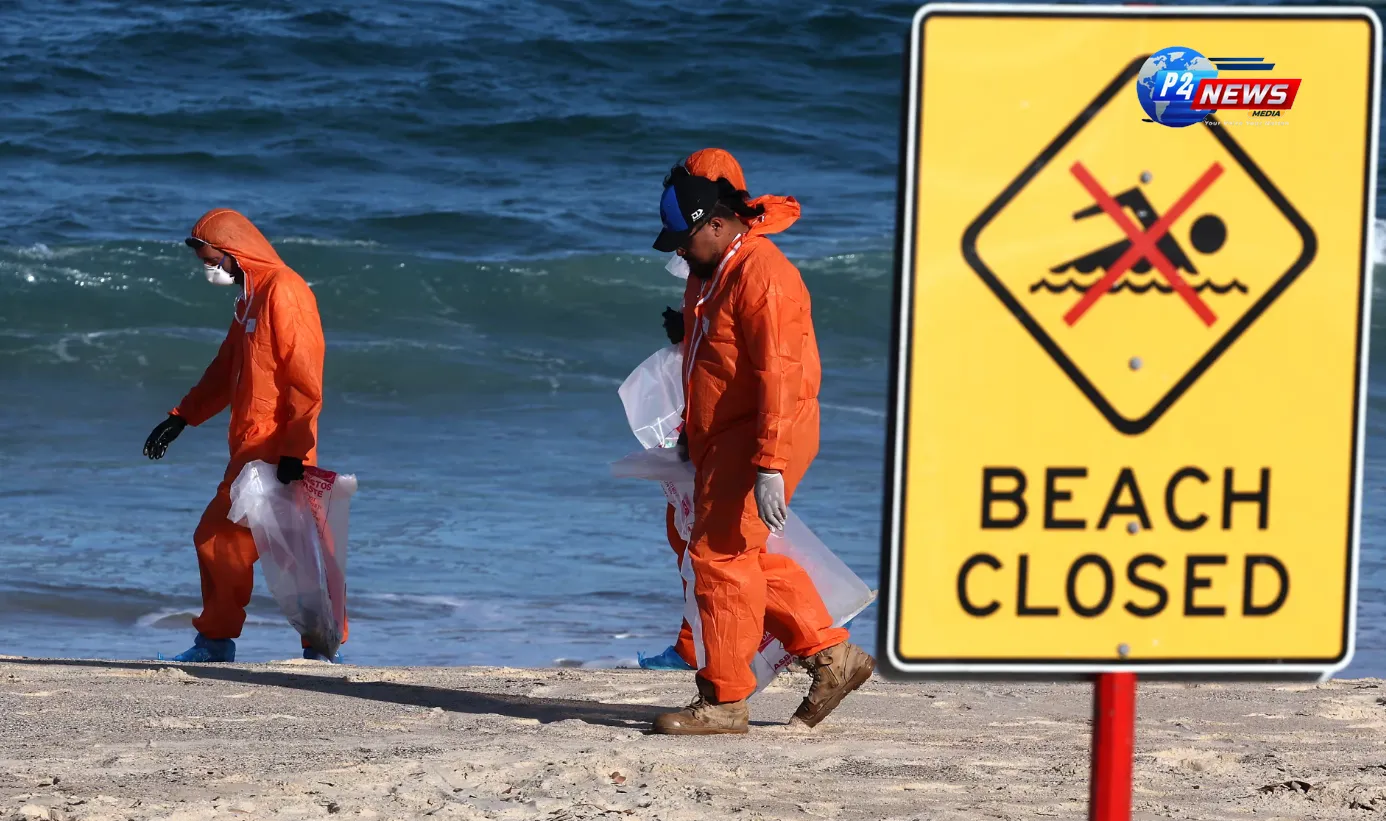Local council reports that grey ball-shaped debris discovered along the shore will undergo testing by the Environment Protection Authority to determine its origin and safety.
Local council reports that grey ball-shaped debris discovered along the shore will undergo testing by the Environment Protection Authority to determine its origin and safety.
Recent events have led to the closure of nine popular beaches along Sydney’s northern coastline due to the unexpected arrival of spherical debris. The Northern Beaches Council issued a warning on Tuesday, advising all beachgoers to steer clear of the affected locations, which include Manly, Dee Why, Long Reef, Queenscliff, Freshwater, and both North and South Curl Curl, as well as North Steyne and North Narrabeen beaches, until further instructions are provided.
In a statement shared on Facebook, the council indicated that they are actively collaborating with the New South Wales Environment Protection Authority (EPA) to not only clean up the unusual balls but also to send samples for further testing. The EPA brought the presence of this debris to the council's attention, leading to immediate precautionary measures.
The debris discovered mainly consists of marble-sized balls, with some larger varieties also reported. The council noted that these spherical objects were predominantly white or grey in color, the origin and composition of which remain a mystery. Mayor Sue Heins expressed her concern over the situation, stating, “We don’t know at the moment what it is, and that makes it even more concerning.” Heins emphasized the potential dangers posed by unidentified objects washing ashore, raising questions about their source and nature.
This latest incident echoes a similar occurrence from October of the previous year when numerous spherical materials scattered across various beaches in eastern suburbs like Bondi, Bronte, Coogee, and Tamarama. Those beaches were also temporarily closed due to the unexpected debris. Initially perceived as crude oil “tar balls,” subsequent testing led by the EPA revealed that the materials were consistent with human-generated waste, often referred to as “fatbergs” by experts in the field.
Reports from the Guardian Australia indicated that there were allegations suggesting the EPA had been aware for over a week that the objects were linked to human waste before making this critical information public. During that time, the EPA released a statement detailing the composition of these balls, identifying them as containing fatty acids, petroleum hydrocarbons, and organic as well as inorganic materials. Alarmingly, traces of drugs, hair, motor oil, food waste, animal matter, and even human faeces were detected.
A spokesperson from Sydney Water clarified that there had been no disruptions in operations at the Bondi or Malabar wastewater treatment facilities. They acknowledged the possibility that the mystery balls might have absorbed wastewater already present in the ocean, yet firmly stated that the formation of these balls did not result from their wastewater discharges. In early December, additional green, grey, and black spheres were reported on a beach in Kurnell, leading to warnings for beachgoers to stay away as samples were collected for further analysis.
NSW Greens environment spokesperson Sue Higginson expressed concern regarding the EPA’s handling of the situation. She pointed out that Sydney Water's admission suggests that the beach contamination issues last year may have stemmed from inadequacies in the current wastewater treatment systems. In December, the Greens raised questions about the EPA’s progress in identifying the debris source, expressing skepticism about the agency’s ability to assure the public regarding the safety of Sydney’s beaches.
Fatbergs, a term used to describe massive clogs in sewer systems, result from non-dissolvable materials—such as grease and oil—accumulating together. Such environmental hazards have sparked discussions on the need for improved waste management practices.
As the new year approaches, many individuals reflect on resolutions and personal commitments. However, some have chosen to abandon the practice of publicly declaring their intentions, believing that this approach may lead to greater accountability to oneself. Instead of stressing over unmet resolutions, it’s suggested that we embrace small victories, understanding that even minimal efforts can lead to personal growth. This year, rather than focusing solely on resolutions, consider supporting independent journalism like that of the Guardian, a step that can help foster vital information sharing during critical times.
In light of these recent beach closures and the ongoing investigations into the mysterious debris, it's crucial for the community to remain informed and engaged. The health of Sydney’s environment and safety for its beachgoers depend on understanding the origins of these debris and taking appropriate actions to mitigate any further risks.
Like
Dislike
Love
Angry
Sad
Funny
Pray
'Trump Tracker: Tulsi Gabbard's Surprising Appointment as US Intelligence Chief
November 14, 20249th Ayurveda Day in Melbourne: A Celebration of Ayurvedic Innovations and Global Health Impact
November 10, 2024🍪 We Value Your Privacy and Experience Hi there! We use cookies to enhance your browsing experience, provide personalized content, and analyze site traffic. By continuing to use our site, you consent to our use of cookies.







Comments 0